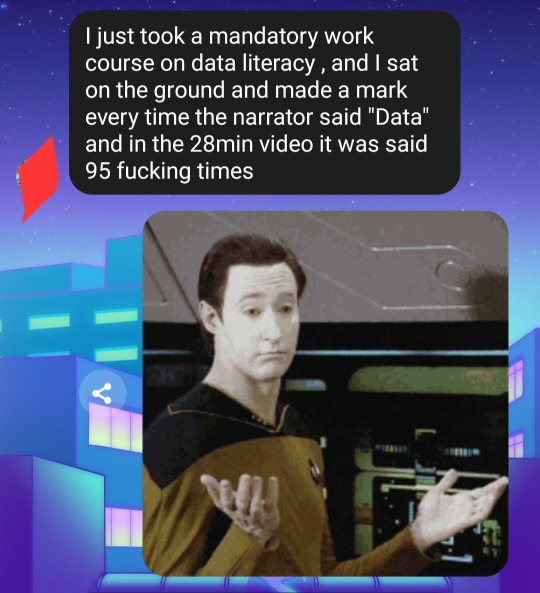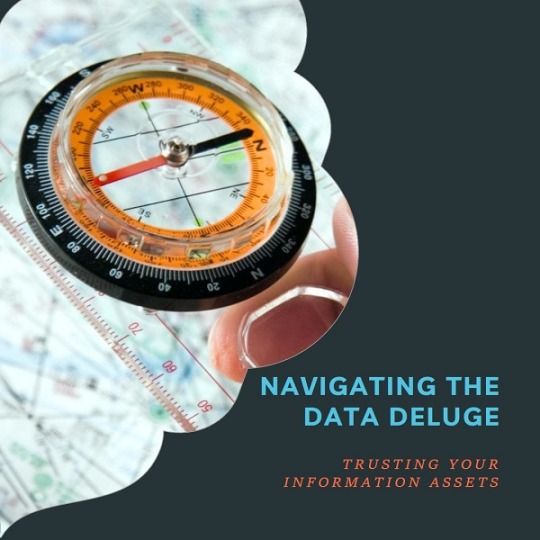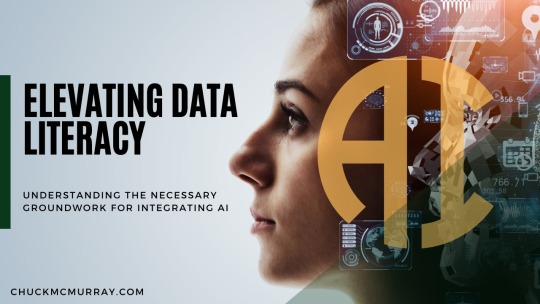#Data Literacy
Text
A conversation I had today

55 notes
·
View notes
Text
Thinking about Mastodon? Peertube? here’s a primer.
youtube
#federated social media#fediverse#mastodon#twitter migration#technology#data literacy#it’s kinda like email but with microblogging and you get to choose which app(server) you access it from#Youtube
35 notes
·
View notes
Text
You all are killing me with your endless "reblog for sample size." Your curiosity is to be commended. As is your urge to do science. I, too, love science.
BUT. You cannot manufacture statistical significance by increasing the sample size if the sampling method is biased in unknown ways, as a convenience sample of an unknown population is bound to be. If your question is, "What do my mutuals and their mutuals think about X?", then a Tumblr poll can perhaps give you an approximate sense. But if your question is "What does the entire population of Tumblr think about X?", no amount of reblogging of that poll is going to get you meaningful, interpretable information, unless you can get all 135 million of us to answer.
#i love a fun poll as much as the next person#but trying to learn tumblr demographics#or the like#using polls is just nonsense#data literacy#on tumblr#polls
2 notes
·
View notes
Text
Nicholas Brackney, Dell: How we leverage a four-pillar AI strategy
New Post has been published on https://thedigitalinsider.com/nicholas-brackney-dell-how-we-leverage-a-four-pillar-ai-strategy/
Nicholas Brackney, Dell: How we leverage a four-pillar AI strategy
.pp-multiple-authors-boxes-wrapper display:none;
img width:100%;
Dell is deeply embedded in the AI landscape, leveraging a comprehensive four-pillar strategy to integrate the technology across its products and services.
Nicholas Brackney, Senior Consultant in Product Marketing at Dell, discussed the company’s AI initiatives ahead of AI & Big Data Expo North America.
Dell’s AI strategy is structured around four core principles: AI-In, AI-On, AI-For, and AI-With:
“Embedding AI capabilities in our offerings and services drives speed, intelligence, and automation,” Brackney explained. This ensures that AI is a fundamental component of Dell’s offerings.
The company also enables customers to run powerful AI workloads on its comprehensive portfolio of solutions, from desktops to data centres, across clouds, and at the edge.
AI innovation and tooling are applied for Dell’s business to enhance operations and share best practices with customers.
Finally, Dell collaborates with strategic partners within an open AI ecosystem to simplify and enhance the AI experience.
Dell is well-positioned to help customers navigate AI workloads, emphasising choice and adaptability through the various evolutions of emerging technology. Brackney highlighted Dell’s commitment to serving customers from the early stages of AI adoption to achieving AI at scale.
“We’ve always believed in providing choice and have been doing it through the various evolutions of emerging technology, including AI, and understanding the challenges that come with them,” explained Brackney. “We fully leverage our unique operating model to serve customers in the early innings of AI to a future of AI at scale.”
Looking to the future, Dell is particularly excited about the potential of AI PCs.
“We know organisations and their knowledge workers are excited about AI, and they want to fit it into all their workflows,” Brackney said. Dell is focused on integrating AI into software and ensuring it runs efficiently on the right systems, enhancing end-to-end customer journeys in AI.
Ethical concerns in AI deployment are also a priority for Dell. Addressing issues such as deepfakes, transparency, and bias, Brackney emphasised the importance of a shared, secure, and sustainable approach to AI development.
“We believe in a shared, secure, and sustainable approach. By getting the foundations right at their core, we can eliminate some of the greatest risks associated with AI and work to ensure it acts as a force for good,” explains Brackney.
User data privacy in AI-driven products is another critical focus area. Brackney outlined Dell’s strategy of integrating AI with existing security investments without introducing new risks. Dell offers a suite of secure products, comprehensive data protection, advanced cybersecurity features, and global support services to safeguard user data.
On the topic of job displacement due to AI, Brackney underscored that Dell views AI as augmenting human potential rather than replacing it.
“The roles may change but the human element will always be key,” Brackney stated. “At Dell, we encourage our team members to understand, explore, and, where appropriate, use tools based on AI to learn, evolve, and enhance the overall work experience.”
Looking ahead, Brackney envisions a transformative role for AI within Dell and the tech industry. “We see customers in every industry wanting to become leaders in AI because it is critical to their organisation’s innovation, growth, and productivity,” he noted.
Dell aims to support this evolution by providing the necessary architectures, frameworks, and services to assist its customers on this transformative journey.
Dell is a key sponsor of this year’s AI & Big Data Expo. Check out Dell’s keynote presentation ‘From Data Novice to Data Champion – Cultivating Data Literacy Across the Organization’ and swing by Dell’s booth at stand #66 to hear about AI from the company’s experts.
The comprehensive event is co-located with other leading events including Intelligent Automation Conference, BlockX, Digital Transformation Week, and Cyber Security & Cloud Expo. Explore other upcoming enterprise technology events and webinars powered by TechForge here.
Tags: ai, ai & big data expo, ai and big data expo, artificial intelligence, dell, enterprise, ethics
#ai#ai & big data expo#AI adoption#ai and big data expo#AI strategy#America#amp#approach#Articles#artificial#Artificial Intelligence#automation#Bias#Big Data#Business#change#Cloud#clouds#Companies#comprehensive#conference#cyber#cyber security#cybersecurity#data#data literacy#data privacy#data protection#deepfakes#dell
0 notes
Text
Finding Your Way Through the Data Deluge: Trusting Your Information Assets
Just one-third of organizations trust the analytics generated from their business operations, despite the critical role these insights play in decision-making
KPMG – Building Trust in Analytics
For large, modern businesses, data is king. Every click, swipe, and purchase generates a wealth of information. But with this abundance comes a challenge: how do you find, understand, and trust your…

View On WordPress
0 notes
Text
Elevating Data Literacy
🔍 Empower your team with data literacy to harness the full potential of AI! Understand data, make informed decisions, and address ethical challenges. Elevate your AI strategy with the right skills. 🚀 #DataLiteracy #AIReady
Understanding the Necessary Groundwork for integrating AI
In the dynamic realm of data management and analytics, fostering a data-literate culture is not just a trend, but a necessity for businesses to unlock the full potential of their data assets. This strategic shift, where leaders across industries are prioritizing data literacy, is not without reason. It’s because data literacy drives…

View On WordPress
#AI Adoption#AI in Business#AI investments#AI optimization#AI training#Bias in AI#Critical thinking#Data analysis#Data literacy#Data privacy#Data-driven culture#Decision-making#Enterprise AI strategy#Ethical AI
0 notes
Text
Data Literacy for Small Nonprofits with Sarah Epting
This episode is sponsored by my friends at Keela, a comprehensive fundraising and donor management software that will help you expand your reach, increase fundraising revenue, and foster a dedicated community of supporters.
Keela is hosting a webinar, led by me, on June 6 – How to Drive Donations and Get Engagement Using Social Media. It’s totally free, and you can get all the details and sign up…

View On WordPress
0 notes
Text
Excellent, resourceful blog about data analysis in the disinformation age.
0 notes
Text
Driving Data Literacy in the Public Sector
Driving Data Literacy in the Public Sector
Driving Data Literacy in the Public SectorDownload

View On WordPress
0 notes
Text
don't kiss me if you're afraid of thunder. my life is a storm.
- anitta krizzan
#dark academia#dark academia aesthetic#chaotic academia#academia aesthetic#literature#dark#chaotic academic aesthetic#academia#literacy#books & libraries#dream#slow dancing#data#darkcore#autumn#classic academia#romantic#rain#romance#reading#love quotes#quotation#book quotes#quotes
57 notes
·
View notes
Text
I’ve been thinking a lot recently about how much I wish we were taught in school how to interact with people online (and just how to use the internet in general) and then I remembered that I can type.
So, without further ado, I present…
How to Argue with People on the Internet
A (sort of) comprehensive guide on discussing everything from world peace to your blorbos
Forewordwarning: This is a long (but hopefully useful and entertaining) post. You have been warned.
SECTION I: The Decision
I have read SO many posts that essentially say “want to stop getting annoyed and fighting strangers? Just don’t! Simply do not!” and if that works for you? Fantastic! That is commendable and I salute you for it and I’m only a little bit jealous. (Okay, maybe more than a little bit jealous.) But if you’re like me—an absolute yapper, that is— you will likely find yourself in quite a few situations where you simply must yap. The urge is too strong. The stupidity of this collection of pixels on your screen that may or may not be the vessel for another human somewhere in the world is too much and you just have to tell them so. I understand. I will not tell you to hold back. I will, however, advise that before engaging with any individuals, you follow a few simple steps that I like to call “RAT”— otherwise known as Rest, Analyze, and Type.
Let’s say, for a moment, that you’ve just run into a comment hating on your favorite character in your favorite TV show. Yes, that one. You want to reply—but wait—you’ve just remembered to use RAT first! You intelligent human, you.
First, you REST. You take a moment to bookmark the comment (whether mentally or literally is up to you) and you step away from your phone (or you do what I do and look at that one youtube video of a parrot asking Alexa to fart 939472 times, you know the one) and you wait. Is this comment something you’re willing to take time out of your day to handle? There’s absolutely nothing wrong with deciding that it is, in fact, worth it— but it’s important to consider it first. You won’t ever have time to talk about the things you’re actually passionate about if you reply to every comment that bothers you. (Trust me— I’ve been there.)
Now, if you’ve decided to continue, reopen the comment and ANALYZE. This can mean many different things depending on the situation: is this comment generated by an AI? Is this person expressing a genuine opinion, or are they a troll? Have other people argued with them? If so, how did they respond? These are all important questions to ask, but it’s okay if you don’t know the answers to all of them. Just get the best information you can; you can always come back to this step later.
Finally, it’s time to TYPE. Let those words fly, friend! You tell ‘em!
SECTION II: Debating vs Fighting
So, you’ve RATted it up, and now you’ve decided it’s time to yap. But how to go about this? Should you be aggressive? Appeal to the enemy? What to do? Don’t worry, I’ve got another acronym for you! It’s time to take MOUSE into account: Motive, Openness, Understanding, Success, and Education.
First, think about your own MOTIVE. What do you want to accomplish? Do you want to change the other person’s mind? Are you unconcerned with changing their mind, instead going in with the intention to change the minds of others who might be reading through the conversation? Do you not care about changing anyone’s mind and simply want to discuss the topic at hand? All of these are valid, but they’re all very different. Deciding what your goal is prior to replying is one of the most important things about debating, whether it’s over the internet or face-to-face.
Once you’ve got that cleared up, it’s time to consider your OPENNESS and UNDERSTANDING. How open are you to potentially having your mind changed? Can you see a piece of truth in the other side of the argument? Do you understand where the commenter is coming from, or are they just being ridiculous? It’s okay to have opinions you aren’t open to changing on a whim— everyone has core beliefs that shape who they are as people. But sometimes looking at the other side through a lens of open-mindedness and a desire to understand is the most effective thing you can do. Give it a try— the worst thing that happens is the other person being just as bad as you thought they were.
Next, it’s time to address SUCCESS. What would succeeding look like here? This is similar to MOTIVE, but now we’re looking at the potential completion of the debate. What is the outcome you’re striving for?
Finally, EDUCATION. Is this a fact-based topic you want to educate people about, or is it purely opinion-driven? Either is fine, but if it’s fact-based, you should brush up on the facts of the situation— you don’t want to be caught in a lie and potentially humiliated, I hope. Also, misinformation on the internet is a huge issue. But mostly the humiliation thing.
Section III: Tips and Tricks
My last acronym contains an assortment of tips and tricks for internet usage and communication: Consent, Anonymity, Privacy, Yapping, Blocking, Apps, Reason, and Ability (CAPYBARA).
One of the most important things in life and on the internet is CONSENT. Now, this doesn’t mean you have to ask permission to voice your opinions— just that you should take into consideration the actual, living person on the other side of the screen. (Unless you’re arguing with an AI, in which case I suppose it probably doesn’t care much one way or the other). Ask before you DM people unless they state that their DMs are open. If someone blocks you, DO NOT make another account to harass them (yes, even if they’re really terrible). Consent online may look different than it does in real life, but it still follows the same ground rule: when in doubt, ASK.
ANONYMITY is another important thing to consider when you’re surfing among the virtual tides. Remember that even if someone displays their real name and picture on a website, you still don’t know them. They could be someone entirely different from the persona they’ve put up on the internet, and that’s okay. We all act differently depending on the situations and settings we’re in, and that’s dialed waaaay up when social media allows us to literally customize ourselves into what we want other people to see. That doesn’t mean you shouldn’t treat people as if they’re real, but it does mean that you should take everything with a grain of salt— especially if someone is being an absolute jerk.
Okay, PRIVACY is the one section in here that anyone under a certain age probably did learn in class— along with its annoying younger cousin, PIRACY (you wouldn’t steal a CAR, would you?) You probably know by now that you shouldn’t share personal data online, so I won’t go into this one too much in this post. There are a billion textbooks about it, and as important as it is, it’s not something I’m really qualified to cover. Just don’t do anything stupid and you should be fine.
YAPPING— everyone’s favorite thing to do on the internet! For the most part, this is a reminder that you should have fun. If you feel like you can’t yap about your interests in the space you’re in, maybe you should relocate— whether that’s to a different app, a different blog, or even just to a different comment section is up to you. You should feel free to voice your opinions and talk about the things you love (within reason—don’t get yourself on an FBI watchlist—but you get the idea).
BLOCKING is one of the most underrated features on many social media apps. There is absolutely nothing wrong with blocking someone and moving on. It doesn’t make you a coward; it makes you someone who values your own time and safety. You are never obligated to argue with someone just because they said so. And—this is one of my favorite internet secrets—you can block people you agree with. If someone’s posts are well-meaning and useful, but they upset you or make you uncomfortable? You can still block them, or mute/restrict them if the app you’re using allows it. You are not a bad person for not wanting to see things that upset you in your day-to-day life. You can support good causes without reading about tragedies every morning. Digging yourself into a depressive hole isn’t going to help anything. Please, please use the block button. It’s there for a reason.
APPS are another variable you should consider when catering your online experience. For instance, you can make a nuanced post on Tumblr and more realistically expect reasonable replies because you aren’t confined to a tiny amount of characters. Trying to express the same point on Twitter, however, likely risks people getting extremely angry at you due to the nature of the app not allowing nuanced conversations. That’s not to say Tumblr is necessarily superior— just that they’re different areas with different setups. The reason Twitter is so no-nuance a lot of the time isn’t just due to the people— the app is deliberately set up so that users can’t make multiple points in one post. This also attracts people who don’t want to have nuanced conversations, which feeds the cycle. This is an (extremely oversimplified) explanation of why most social media apps feel so separate from each other, even if you follow all the same people. You should know your audience—but you should also know your stage.
It’s important to have a certain amount of REASON and common sense when you’re talking to someone about the skrunkly little guys in your favorite movie. It’s not that you can’t be passionate—I once essentially made an entire powerpoint presentation about why I think my opinion about a fictional cat person is the correct one—but you need to remember that not everything is the same level of seriousness. Expressing an opinion about whether Team Rocket are actually villains is not the same thing as expressing an opinion about the upcoming US election. (Though I think Team Rocket could potentially do an okay job, to be honest. Meowth 2024?) You can 100% have intense, long discussions about fictional characters, but it’s never worth genuinely harming your own mental health or attacking someone else because of an opinion that ultimately doesn’t hurt anyone. It’s okay to agree to disagree.
Lastly, remember that a lot of this is not intuitive. Your ABILITY to make smart decisions online is a skill that takes time to develop (as is evidenced by 99% of past me’s Twitter posts) and it’s important to give yourself grace. As much as the internet hates to admit it, we all make mistakes. Just own up to those mistakes and move on. It’s okay to delete a post you made because you don’t agree with it anymore. It’s okay to come back to an argument and apologize for going too far. It’s okay to not be perfect. Accept the consequences of your own actions and move forward.
#i hope this is helpful#advice#internet#media literacy#yapping#professional yapper#controversy#internet drama#arguing#tips and tricks#tips and advice#tips and strategies#how tos#social media#debate#online safety#internet safety#education#safety#guidance#fyi#text post#yapyapyap#communities#fandom#online privacy#data privacy#pro tip#*demon noises* P R O T I P 👹👻💀😈#milesrambles
15 notes
·
View notes
Text
Hmm a fresh cup of coffee will certainly fix this and, if not, bourbon
#i looked at too much data this morning lmao#doomjazz#hey at least my science and math literacy is better than ever before lmao
7 notes
·
View notes
Text

logically speaking do the two not go hand and hand???
8 notes
·
View notes
Text
Gartner Data & Analytics Summit São Paulo: Mercado Livre’s AI and Data Democratization in Brazil
New Post has been published on https://thedigitalinsider.com/gartner-data-analytics-summit-sao-paulo-mercado-livres-ai-and-data-democratization-in-brazil/
Gartner Data & Analytics Summit São Paulo: Mercado Livre’s AI and Data Democratization in Brazil
I had the opportunity to attend the Gartner Data & Analytics Summit in São Paulo, Brazil, from March 25-27. The conference brought together industry leaders, experts, and practitioners to discuss the latest trends, strategies, and best practices in data and analytics. Brazil’s growing importance in the AI landscape was evident throughout the event, with many insightful presentations and discussions focusing on AI adoption and innovation.
One of the interesting talks I attended was delivered by Eduardo Cantero Gonçalves, a senior Data Analytics manager at Mercado Livre (MercadoLibre). Mercado Livre is a leading e-commerce and fintech company that has established itself as a dominant player in the Latin American market. With operations spanning 18 countries, including major economies such as Brazil, Argentina, Mexico, and Colombia, Mercado Livre has built a vast online commerce and payments ecosystem. The company’s strong market presence and extensive user base have positioned it as a leader in the region.
During his presentation, Gonçalves shared Mercado Livre’s remarkable journey in democratizing data and AI across the organization while fostering a strong data-driven culture. As AI continues to transform industries worldwide, Mercado Livre’s experience offers valuable lessons for organizations looking to harness the power of AI and build a data-driven culture.
In this article, we will explore the key takeaways from Gonçalves’s presentation, focusing on the company’s approach to data democratization, empowering non-technical users with low-code AI tools, and cultivating a data-driven mindset throughout the organization.
Mercado Livre’s Data Democratization Journey
Mercado Livre’s journey towards data democratization has been a transformative process that has reshaped the company’s approach to data and AI. Gonçalves emphasized the importance of transitioning from a centralized data environment to a decentralized one, enabling teams across the organization to access and leverage data for decision-making and innovation.
A key aspect of this transition was the development of in-house data tools. By creating their own tools, Mercado Livre was able to tailor solutions to their specific needs and ensure seamless integration with their existing systems. This approach not only provided greater flexibility but also fostered a sense of ownership and collaboration among teams.
One of the most significant milestones in Mercado Livre’s data democratization journey was the introduction of machine learning tools designed for both data scientists and business users. Gonçalves highlighted the importance of empowering non-technical users to harness the power of AI and ML without relying heavily on data science teams. By providing low-code tools and intuitive interfaces, Mercado Livre has enabled business users to experiment with AI and ML, driving innovation and efficiency across various departments.
The democratization of data and AI has had a profound impact on Mercado Livre’s operations and culture. It has fostered a more collaborative and data-driven environment, where teams can easily access and analyze data to inform their strategies and decision-making processes. This shift has not only improved operational efficiency but has also opened up new opportunities for growth and innovation.
Empowering Non-Technical Users with Low-Code AI Tools
One of the key highlights of Mercado Livre’s data democratization journey is their focus on empowering non-technical users with low-code AI tools. During his presentation, Gonçalves emphasized the importance of enabling business users to experiment with AI and machine learning without relying heavily on data science teams.
To achieve this, Mercado Livre developed an in-house tool called “Data Switch,” which serves as a single web portal for users to access all data-related tools, including query builders, dashboards, and machine learning tools. This centralized platform makes it easier for non-technical users to leverage AI and ML capabilities without needing extensive programming knowledge.
Gonçalves specifically mentioned that Mercado Livre introduced low-code machine learning tools to allow business users to run experiments independently. By providing intuitive interfaces and pre-built models, these tools enable domain experts to apply their knowledge and insights to AI-powered solutions. This approach not only democratizes AI but also accelerates innovation by allowing more people within the organization to contribute to AI initiatives.
The impact of empowering non-technical users with low-code AI tools has been significant for Mercado Livre. Gonçalves noted that the company saw a substantial increase in the number of active users, data storage, ETL jobs, and dashboards following the introduction of these tools.
Mercado Livre’s success in this area serves as a valuable case study for other organizations looking to democratize AI and empower their workforce. By investing in low-code AI tools and providing the necessary training and support, companies can unlock the potential of their non-technical users and foster a culture of innovation.
Fostering a Data-Driven Culture
In addition to democratizing data and AI tools, Mercado Livre recognized the importance of fostering a data-driven culture throughout the organization. Gonçalves highlighted several key initiatives that the company undertook to cultivate a mindset that embraces data and AI-driven decision-making.
One notable step was the creation of a dedicated Data Culture area within Mercado Livre. This team was tasked with promoting data literacy, providing training, and supporting data-driven initiatives across the organization.
To measure the success of their data culture efforts, Mercado Livre developed a “Data Driven Index” that tracks user engagement with data tools. This index provides a quantitative measure of how well employees are adopting and leveraging data in their daily work. By regularly monitoring this index, the company can identify areas for improvement and adjust their strategies accordingly.
Another key initiative was the “Data Champions” program, which aimed to train advanced users who could then help multiply the data-driven culture throughout the organization. These champions serve as advocates and mentors, promoting best practices and assisting their colleagues in leveraging data and AI tools effectively. By empowering a network of champions, Mercado Livre was able to scale its data culture efforts and drive adoption across the company.
Lessons Learned from Mercado Livre’s Experience
Mercado Livre’s journey in democratizing data and AI offers valuable lessons for other organizations looking to embark on a similar path. One of the key takeaways from Gonçalves’s presentation was the importance of executive sponsorship in promoting a data-driven culture. Having strong support and advocacy from leadership is critical in driving organizational change and ensuring that data and AI initiatives are given the necessary resources and priority.
Another important lesson is the value of collaborating with HR to integrate data-driven culture into employee onboarding and development programs. By making data literacy and AI skills a core part of employee training, organizations can ensure that their workforce is well-equipped to leverage these tools effectively. Mercado Livre’s partnership with HR helped them to scale their data culture efforts and make it a fundamental part of their employees’ growth and development.
Finally, Gonçalves emphasized the importance of continuously measuring and iterating on data-driven initiatives. By tracking key metrics such as the Data Driven Index and regularly seeking feedback from employees, organizations can identify areas for improvement and make data-informed decisions to optimize their strategies. This iterative approach ensures that data and AI initiatives remain aligned with business objectives and drive meaningful impact.
As organizations navigate the challenges and opportunities of the AI era, Mercado Livre’s experience serves as a valuable case study in democratizing data and AI while fostering a data-driven culture. By empowering employees at all levels to leverage these tools and cultivating a mindset that embraces data-driven decision-making, companies can position themselves for success in our AI-driven world.
#ai#ai tools#AI-powered#amp#Analytics#approach#Article#Artificial Intelligence#Brazil#Business#Case Study#change#code#Collaboration#collaborative#Commerce#Companies#conference#data#data analytics#data democratization#data literacy#data science#data storage#data-driven#democratization#development#E-Commerce#efficiency#Employee Training
0 notes
Text
The Importance of Data Quality for African Businesses
In the midst of the myriad challenges facing African businesses, it’s crucial to underscore the importance of addressing data quality issues. Poor data quality causes operational efficiencies and inhibits decision-making. While data quality challenges may seem daunting, they also present opportunities for growth, innovation, and competitiveness. Here’s why data quality is of paramount importance…

View On WordPress
#analyst report#business agility#competitive advantage#Data Literacy#data protection#data quality#data transparency#decision-making#innovation#operational efficiency
0 notes